Earth Day 2024: Driving productivity and profitability in a sustainable way
22nd April 2024
On 18th April, farmers were invited to attend the second South East Future of Farming Conference held at Plumpton College, with all proceeds from the ticket sales being donated to RABI. Farmers Guide editor, Rachel Hicks, was there.
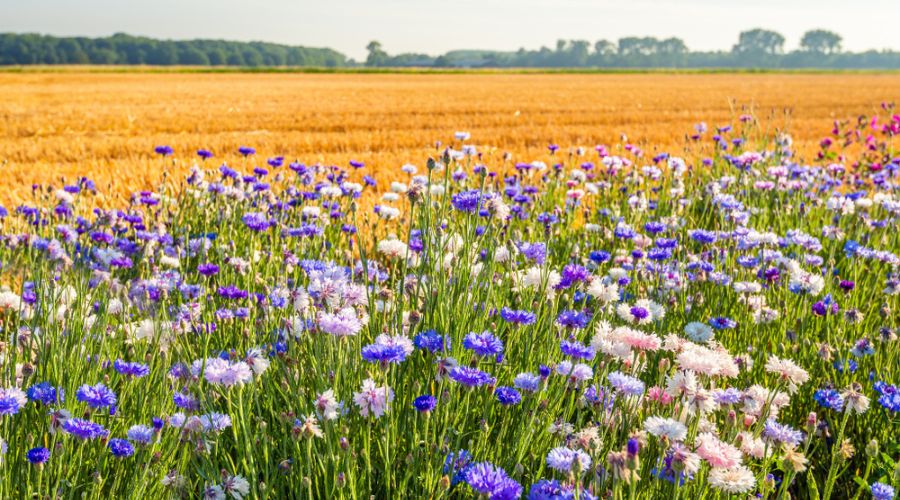
Opening the conference, Brian Robertson from event sponsor Virgin Media welcomed everyone to the second Future of Farming – pointing out the appropriateness of the location, given that the focus of the conference was around what the future of the farming industry looks like. Mr Robertson explained that the college has a vital role in educating those who will be directly involved in that future, and has a huge part to play in knowledge exchange and thought leadership.
He pointed out that there are a lot of changes happening currently in the industry – the evolution of the support mechanisms; development of net zero and climate policy to drive the wider agenda in this important area; and vitally, how we maintain within that the successful and profitable production of food as a cornerstone of farming, into the long term.
During his travels around the country, Mr Robertson says he has very much sensed a ‘wait and see’ attitude, while farmers try to understand what that future pathway might look like, and the policy framework they’re going to be working within.
“That said, there is a very clear focus from farmers on productivity and efficiency, given the financial headwinds we’ve seen recently with inflation etc, alongside that very important day job of managing the farm, and dealing with the exceptional wet weather creating challenges, which we’ve all seen,” he said.
So, according to Mr Robertson, the sooner we get a refreshed vision for English farming set out, the better. “Farmers are very good at adapting to what’s being asked of them, but they need to understand what that pathway looks like, with the required direction of travel clearly set out. Something which we don’t have at the moment,” he concluded.
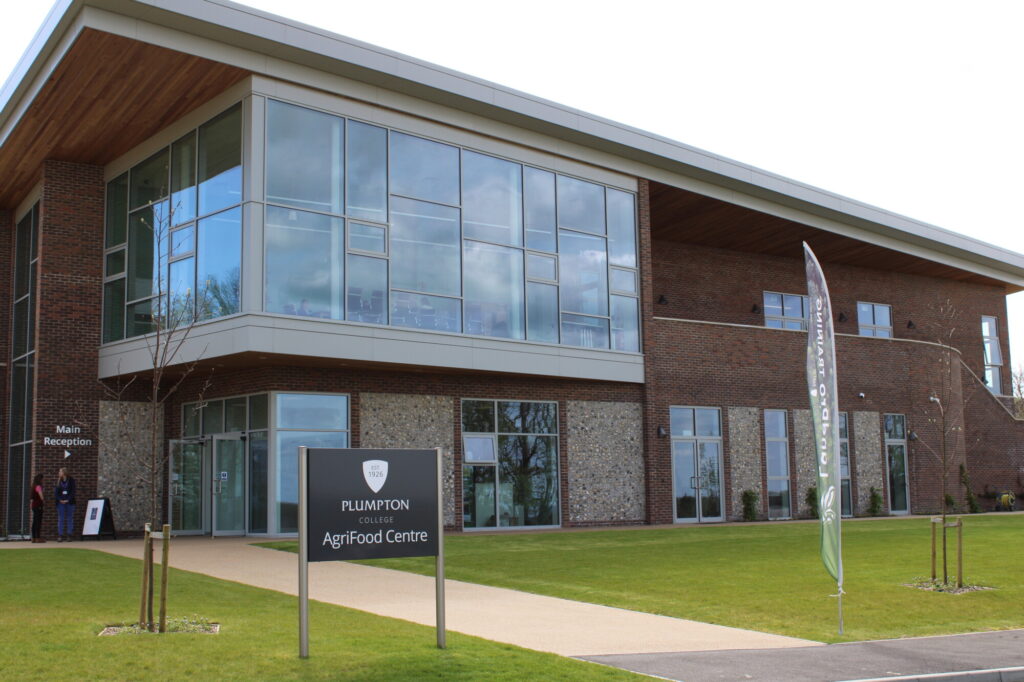
Share and learn
The event was chaired by farmer and rural policy advisor, Emily Norton. Ms Norton said: “This is a time when it’s more important than ever to share information, and learn from each other.
“It’s a difficult time to be thinking about vision in the sector, and trying to find the confidence to take one direction and start moving in it is the real difficulty, as there is so much to consider.”
The one silver lining, commented Ms Norton, is that the extreme weather this winter has brought food security into focus for policy makers.
Climate change is happening
The first speaker was Lord Deben, who farms organically with a herd of redpoll cattle as well as an arable enterprise.
Lord Deben explained that the most important thing in any business, but particularly in farming, is that the certainties need to be considered first and foremost – as unless you start with the certainties, you can’t deal with the uncertainties. He commented: “The number one certainty in farming currently is that climate change is happening; is happening faster; and is going to be a central issue for all involved in farming. Therefore, farming is going to have to handle weather patterns that we have never handled before. The primary problem is with water, and the extremes of too much and too little.
“The second certainty is the increasing demands on government to do something about climate change – therefore it is clear that farmers are going to be asked to play their part.
“The third certainty is the result of these – which is that there will be a greater pressure on food production than the UK has ever seen in this lifetime, since WW2.”
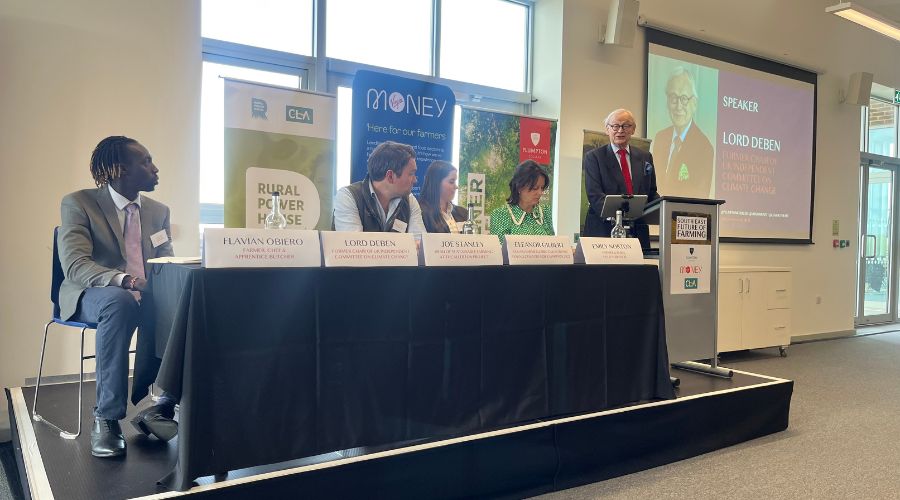
As far as Lord Deben is concerned, the first public good that farmers produce, is the food needed to feed the nation. It’s not a case of food production versus improving sustainability and supporting the environment – farmers need to do both.
“If the industry accepts the truth, which is that every year it’s going to be more difficult to produce the food, to look after the environment; if the industry accepts that every year, people are going to demand more action on climate change because they’ve been flooded when they hadn’t before recent times; then the industry needs to go to government with solutions as to how to do this, so that the people of Britain know the farming industry is doing all it can.”
Lord Deben reckons the three things we need from the government are:
- Certainty – we need to know what government is going to do, and that it will stick to that over a long period of time so that farmers can operate within it, and not change the policy regularly, even if it isn’t perfect.
- Acceptance from government that we absolutely have to produce as much food domestically as we can. Yes, in the context of looking after the soil, and the lands, so that we can go on producing food long-term – but food production has to be at the heart of any policy, which it hasn’t been so far.
- There is no reason why there should be party political division on the question of agriculture. There is no party political distinction between the needs that we have nor the mechanisms that we should be delivering. Political parties should not be trying to outbid each other on the question of agriculture – we need to have a policy which sticks, for the long term. If we don’t have that, we won’t be able to deliver what Britain needs, and the public may begin by blaming farmers, but in the end they’ll rightly blame the politicians. We just need to get the politicians to recognise that they’re in the frame, and it’s their heads that are on the block.
Following Lord Deben’s presentation, Emily Norton picked up on the point that there is no current legal definition of food security written into legislation anywhere – which is needed in order to allow the industry to meet these obligations.
Production and environment, side by side
Speaker Joe Stanley describes himself as an ‘incredibly average’ farmer. His background is as a conventional arable, beef and dairy farmer, but for the last three years he’s been working at the Allerton Project – a research and demonstration farm in Leicestershire, which since 1992 has been trying to demonstrate how a thriving natural environment can exist side by side with modern, productive and hopefully profitable food production.
The fully working, commercial farm has a full-time team of research scientists, whose research has included elements such as:
- Silvopasture/agroforestry. Investigating how you can still get agricultural production from the land while at the same time doubling up on all sorts of natural capital benefits that trees can bring into that landscape
- Reduced tillage and the benefits that that can hopefully bring in terms of soil health and the farm’s bottom line, as well as emissions
- Wildflower mixes, bumble bird mixes, winter birdseed mixes – things you can include around your farm that not only will benefit the environment with biodiversity but could also improve the efficiencies of your farming business by taking out unproductive areas such as awkward field corners. Also, beetle banks – Mr Stanley showed an example of a beetle bank running through the middle of an arable field, to improve the level of IPM natural beneficial predators. The example showed the bank running through the field where a line of telegraph poles were already present, so the beetle bank also has the potential to reduce risk of machinery damage at the same time, as well as potentially reducing downslope soil erosion.
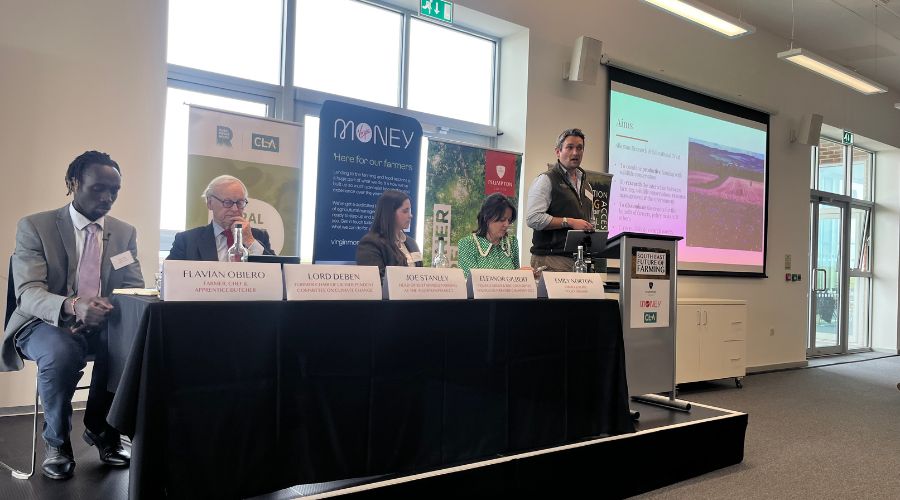
These all have the potential to be paid for under agri-environment schemes, while boosting the efficiency of the farm business at the same time, as improving the amount of natural capital services that the farm is providing.
Mr Stanley reckons we need to stop talking about how much land we need to take out of production in order to benefit the environment. Instead, he says it’s an immutable fact that we actually need to be increasing food production, under hopefully high environmental and welfare standards.
“There is no one simple solution to the problems that we face in terms of producing sustainable, healthy and affordable food, and this is an incredibly complex issue that the industry has to get to grips with,” he explained.
“It’s public opinion which is going to start to shift supermarket behaviour and political behaviour, so this is where we need to be putting our resource.”
Building resilience
In recent years we’ve suffered extreme drought, extreme rainfall, and every extreme in between – so how do we build resilience into the system to deal with this?
Mr Stanley commented that many farmers are familiar with the concept of regenerative agriculture – some may just call it just good traditional mixed farming practice, but ultimately the key principles are:
- Increasing biological diversity both within the cropping rotation as well as across the wider farming landscape
- Maintaining living roots within the soil for as much of the year as possible
- Providing soil protection to make sure we’re not losing that valuable resource
- Reducing soil disturbance both through chemical inputs and also reduced cultivations
- Integration of organic matters, ideally through integration of grazed livestock into the system – this is where farming a mixed practice isn’t necessarily the same as integrating livestock as part of a regenerative plan, as for many mixed practices those livestock don’t integrate into the arable part of the land – instead, staying on the permanent pasture, rather than being used as a break within the arable system.
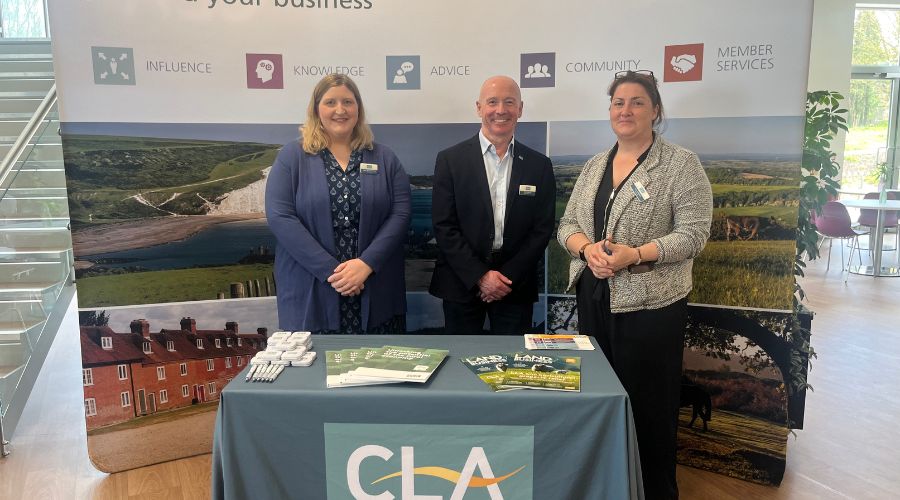
Using data from the Allerton Project’s long-running project with Syngenta, Mr Stanley showed a comparison between a five-year ploughed rotation versus five-year direct drill rotation on two sites – one on heavy land and the other on light.
Loddington (heavy clay site) showed a roughly 8% drop in yield for direct drilled versus ploughed. However, net profit was up by 15% as a result of the cost savings for fuel, time and fixed costs.
On the lighter soil site, at Lenham in Kent, there was no yield drop in the direct drilled approach versus ploughed, and profit was also up – alongside the improved environmental metrics around biodiversity and emissions.
CO2 loss directly behind the plough was around 700% higher than behind the direct drill. This is therefore a significant issue that should be factored into decision making processes. So, asked Mr Stanley, would you rather have slightly more grain in your shed, or more money in your pocket and know you have done your part for the environment?
Read more environmental news.
